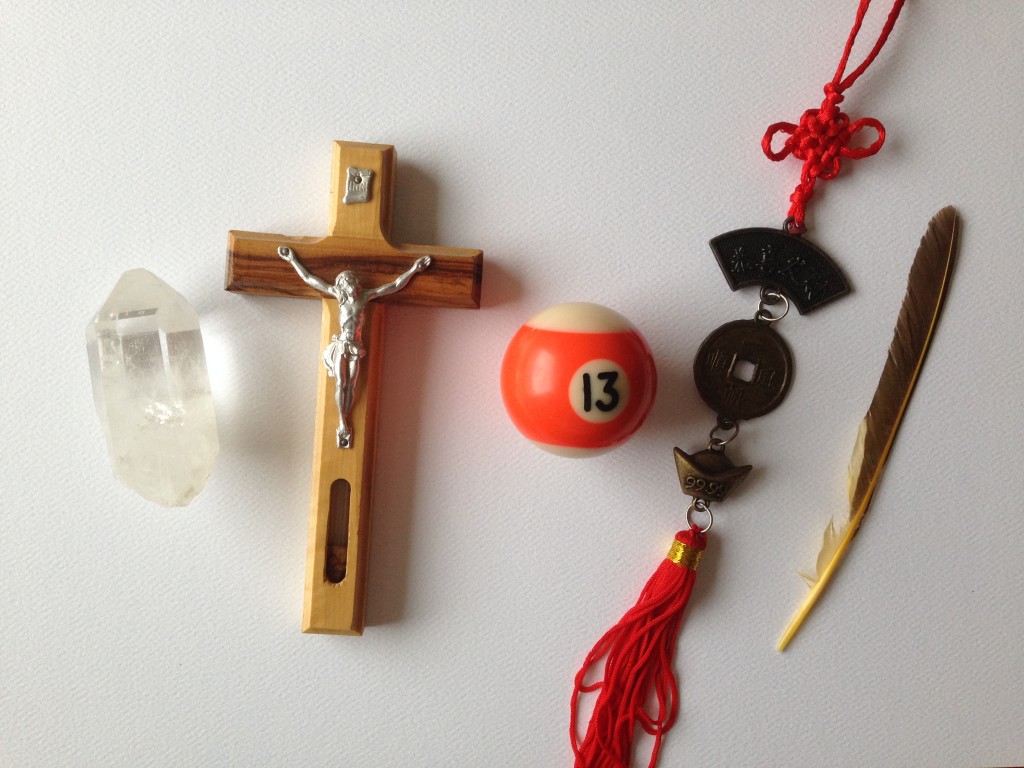By Ian Alexander Cuthbertson
Ian is a Cultural Studies PhD Candidate at Queen’s University in Kingston, Ontario, Canada. His PhD thesis explores discourse surrounding lucky and protective objects in Montréal, Québec.
The label ‘superstitious’ is not a neutral designation. Calling a belief or practice superstitious usually implies that belief or practice is irrational, deluded, or at the very least silly. There is also a sense that human progress has depended upon humankind overcoming its superstitions and delusions, replacing magical explanations with rational ones, and consigning belief in the efficacy of good luck charms to the dustbin of history. Yet as the psychologist Stuart A Vyse has argued, superstitions persist even in our technologically advanced world. Although we might grin or roll our eyes at the notion that a rabbit’s foot, four-leaf clover, or lucky coin might have real effects in the world, many of us still possess lucky objects – including President Obama.
In his yearly YouTube interview, the president spoke with the prolific YouTube creator Ingrid Nilsen. Nilsen asked the president to bring in a personal item and to speak about what it means to him. Instead, president Obama brought several items: a rosary given to him by Pope Francis, a little Buddha figure given to him by a Buddhist monk, a lucky poker chip given to him by a biker, a statuette of the Hindu god Hanuman, and a Coptic cross from Ethiopia. According to Obama, these objects are just a few examples of the many “lucky charms or keepsakes” that people have given him over the years – lucky charms that the president now habitually keeps in his pocket.
Russell McCutcheon has already commented on how the president keeping non-Christian religious objects has caused some to question his Christian credentials. But while there is much to be said about claims concerning authentic (or in this case inauthentic) religious practices, I am more interested in the ways Obama explains and justifies carrying these kinds of objects on his person.
Obama’s rationale for carrying around lucky objects in his pockets is interesting to me because it highlights some of the findings of my PhD research on lucky and protective objects in Montréal, Québec. What I’ve found is that while many people possess and use lucky and protective objects in their daily lives, they (like Obama) seem to employ a number of strategies to rationalize and explain their apparently superstitious beliefs and practices.
I first noticed this trend in the online survey I conducted. While many of my respondents reported possessing lucky and protective objects, a large number of these also added additional explanations or disclaimers in the comments section at the end of the survey. Some respondents assured me that of course they did not take any of this seriously. Other respondents explained that their objects were not powerful in themselves but instead instilled confidence in them during difficult situations. Still others explained that these objects were simply mementos of important people in their lives. So how does Obama explain his lucky objects?
Like many of my research participants, Obama explains that these objects are not really about luck at all but instead remind him either of particular values (the rosary from Pope Francis makes him think about “peace and promoting understanding and ethical behaviour.” for instance), or else of particular people he has “met along the way.” But Obama also offers a psychological explanation of the objects’ efficacy when he remarks, “If I feel tired or I feel discouraged sometimes I can kinda reach into my pocket and I say yeah, that’s something I can overcome.” The idea that lucky objects work via human psychology rather than through actual magic is also popular among academics. Bronislaw Malinowski, for instance, has argued that Trobriand islanders use magic to manage particularly dangerous situations such as offshore fishing.
But if lucky objects really only remind their owners of important memories or help instill confidence in stressful situations, why call them lucky at all? Or to put it somewhat differently, given these sophisticated and rational explanations, are lucky objects really superstitious?
My research indicates that (at least some) people really do believe that lucky objects bring good luck via supra rational means. The problem is that they tend to be very reluctant to admit this. Over the last year I have conducted several in-depth semi-structured interviews with Montrealers in order to further explore this issue. Several of my respondents have commented on the apparent social stigma associated with possessing good luck charms. As one interview participant puts it, “I do find that you have to be careful who you talk about this stuff with because some people will be like oh my god, you’re crazy, what are you talking about?” As another explains, “lucky objects are “considered old-fashioned and not scientific and something old people will do but it’s dying out and if you do that you’re duped.” Or to return to president Obama, he is careful to note, “I’m not that superstitious so it’s, you know, its not like I think necessarily I have to have them on me at all times.”
Of course it’s very possible that president Obama doesn’t think he has to carry lucky objects on him at all times. But I find it interesting that he nevertheless feels the need to reiterate this in the interview. In fact, while some may be concerned that the president sometimes carries Hindu and Buddhist religious symbols in his pockets, Obama seems more concerned with being labeled superstitious. He isn’t alone in this.
Also, I should note that the photo at the beginning of this post is of a few of the lucky objects I own. But don’t worry – I’m not that superstitious either.
